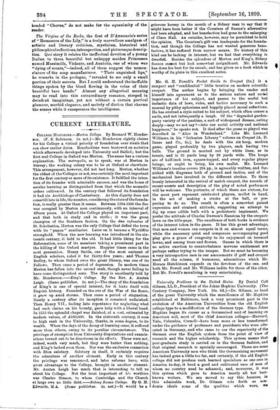CURRENT LITERATURE.
COLLEGE HISTORIES.—Merton College. By Bernard W. Hender- son. (F. E. Robinson. 5s. net.)—Mr. Henderson rightly claims for his College a virtual priority of foundation over rivals that can show earlier dates. Benefactions were bestowed on societies which afterwards developed into University and Balliol ; but the first real College in Oxford was Merton. The name has a curious explanation. The metropolis, so to speak, was at Merton in Surrey; the working colony was to be at Oxford or elsewhere. This arrangement, however, did not last long. Merton, whether the oldest of the 'Colleges or not, was certainly the most important for the first century or more of its existence. It fulfilled the inten- tion of its founder with admirable success, and was the home of secular learning as distinguished from that which the monastic orders cultivated. In the century that followed its foundation it had six Archbishops of Canterbury. As this dignity does not come till late in life, the number, considering the state of the founda- tion, is really greater than it seems. Between 1294-1366 the See was occupied by Merton men continuously, with an interval of fifteen years. At Oxford the College played an important part, and that both in study and in strife ; it was the great champion of the Southern faction. On the dies infaustus of St. Scholastica, Merton was the only College that defied the town with its "pagan" auxiliaries. Later on it became a Wycliffite stronghold. When the new learning was introduced in the six- teenth century, it held to the old. It had little liking for the Reformation, some of its members taking a prominent part in the killing of the Oxford martyrs. Happier times came in the next generation. Henry Savile, one of the most eminent of English scholars, ruled it for thirty-five years ; and Thomas Bodley, to whom Oxford owes the great library, was one of its Fellows. Then came a period of depression. In modern times Merton has fallen into the second rank, though never failing to have some distinguished sone. The story is excellently told by Mr. Henderson.—King's College. By the Rev. A. Austen Leigh. (Same publisher. 6s. net.)—The story of the foundation of King's is one of special interest, for it links itself with English history. Founded on the eve of the War of the Roses, it grew up amid storms. Then came a period of stagnation. Nearly a century after its inception it remained unfinished. Then Henry VII., feeling late repentance for neglecting what had such claims on his bounty, gave help with a liberal hand. In 1515 the splendid chapel was finished, at a cost, estimated by modern values, of £160,000. In the sixteenth century, it rose to high rank in the University, thanks, in some degree, to its wealth. When the days of the decay of learning came, it suffered more than others, owing to its peculiar circumstances. The privilege of exemption from University disputations and examin- ations turned out to be disastrous in its effects. These were not, indeed, worth very much, but they were better than nothing, and King's lacked even them. Nor was the exclusive connection with Eton salutary. Salutary in itself, it certainly requires the admixture of another element. Early in this century the privilege was renounced, and later reforms have, with great advantage to the College, brought in another element. Mr. Austen Leigh has much that is interesting to tell us about his College. Not the least important of hie worthies was Charles Simeon, to whom Cambridge and the Church at large owe no little debt.—Sidney Sussex College. By G. M. Edwards, M.A. (Same publisher. 5s. net.)—It would be a grievous heresy in the mouth of a Sidney man to say that it might have been better if the Countess of Sussex's alternative had been adopted, and her benefaction had gone to the enlarging of Clare Hall. An outsider, however, may be permitted to hold the opinion. The Countess's gift was inadequate for the founda- tion, and though the College has not wanted generous bene- factors, it has suffered from narrow means. No history of this kind can be lacking in interest, but we feel that everything is dwarfed. Besides the splendour of Merton and King's, Sidney Sussex cannot but look somewhat insignificant. Mr. Edwards has done his best for its annals, and has given us a book which is worthy of its plate in this excellent series.


































 Previous page
Previous page